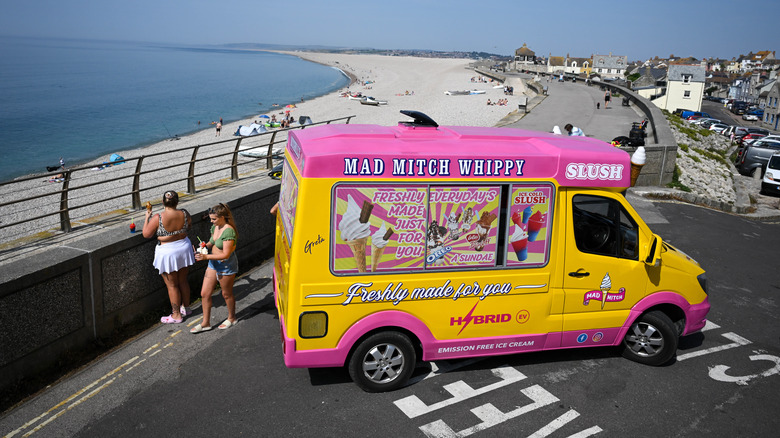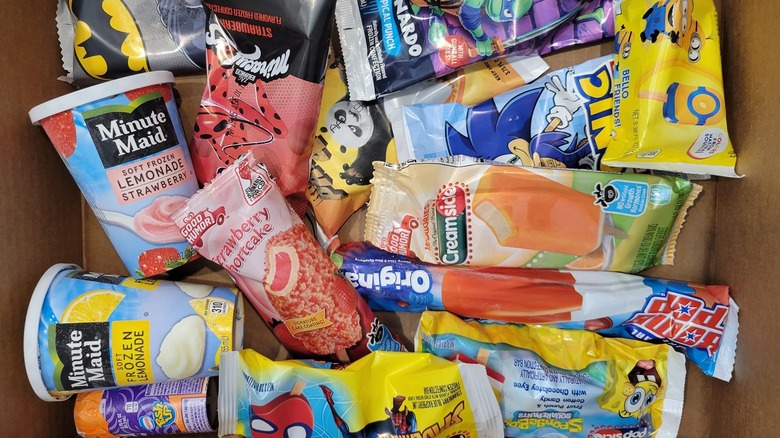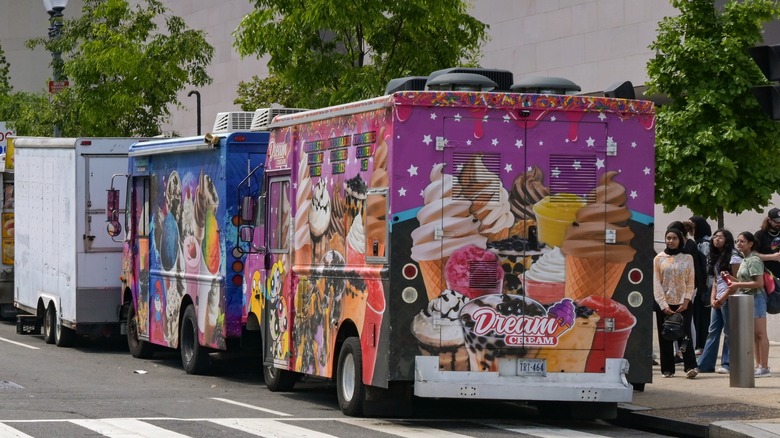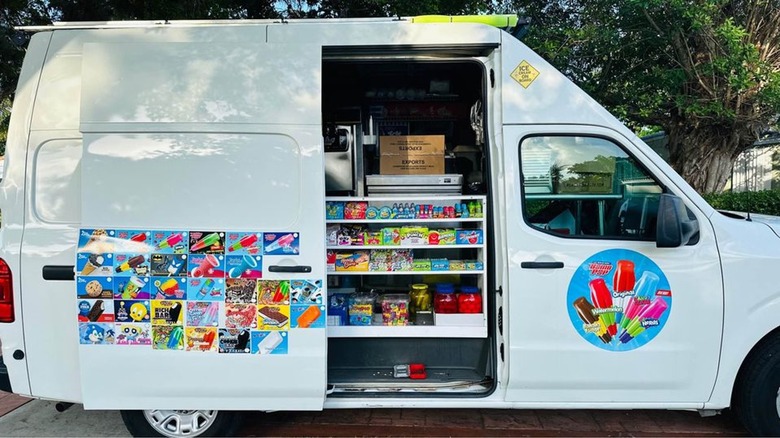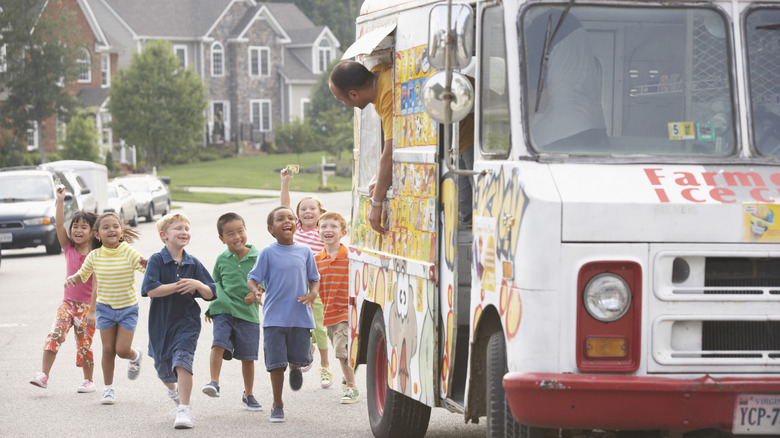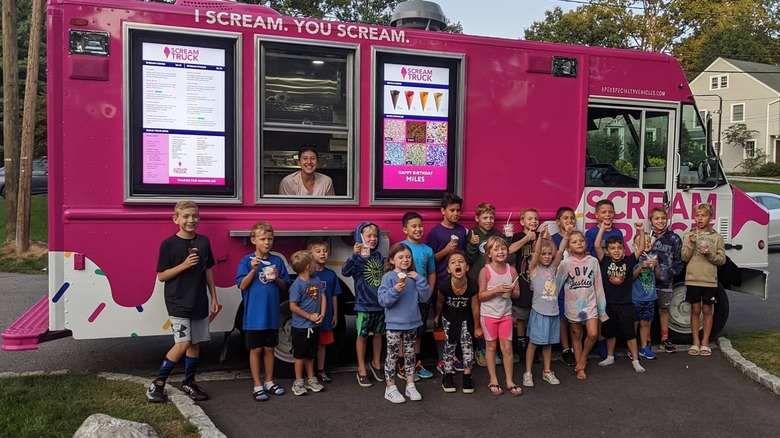What Ice Cream Truck Drivers Don't Want You To Know
There are a lot of secrets in the ice cream truck business that both proprietors and drivers may not want you to know. While some relate to how the companies make their profits, other secrets are more related to cleanliness, pollution, and the potentially unsavory underbelly of the business. Yet the more complicated truth is that ice cream truck business is evolving and doesn't necessarily look exactly like you remember it from childhood, as companies are finding ways to be more profitable in today's economy. Not everyone has what it takes to make it, after all, and there are some secrets that businesses might be using to stay above the competition.
To learn about some of the secrets of the ice cream truck world, we talked to experts from two of the best ice cream trucks in the U.S. to get some of our answers. These are Karen Trauner, the owner of Sticks and Cones Ice Cream in Charlotte, North Carolina and Eric Murphy, the founder and CEO of Scream Truck in New Jersey. Both gave us an eye-opening view of some things you may not have known about the ice cream truck business. Going through historic accounts and news reports, we found some other tidbits of the business that may not always be obvious to the public.
They may not be in your neighborhood because the money is elsewhere
If you don't hear an ice cream truck in your neighborhood regularly anymore, there might be a good reason for that. Sure, people still like ice cream, but your neighborhood just may not be the best place for trucks to make money anymore.
Trauner told us that her trucks no longer drive through neighborhoods for just this reason. "It's too darn hot for people to leave their air conditioning in the dead heat of July or August and go outside for an ice cream!" she said. "In my business model, almost all my work is contracted catering, mostly for businesses' employee or customer events." In the food truck model of business, truck owners park in one spot and let the business come to them rather than the other way around.
Murphy found a way for his Scream Trucks to work around the problem of people not being outside in neighborhoods anymore, thanks to the use of modern technology. "We text customers letting them know we'll be visiting their neighborhood and customers can reserve a stop at their house," he said. "If we don't get enough reservations from one neighborhood, we can continue to text adjacent or nearby neighborhoods until we hit our target number of stops (10-12) each hour. This creates parity across most towns/neighborhoods we serve."
Where they get their ice cream
Different ice cream trucks get product from a variety of sources. While some make their own, others buy wholesale. In other words, you're unlikely to see your local ice cream truck driver grabbing products at the grocery store because that would cut into profits.
Murphy told us that his company uses "premium 10% milk fat, soft serve ice cream mix from Upstate Farms in Upstate NY." However, that's not a secret that will do much to help you make ice cream at home, since a high-quality professional machine for making soft serve ice cream can cost several thousands of dollars.
That can be a serious cost to the business, too. According to Trauner, "We purchase our ice cream from wholesalers; we don't make our own." For many businesses, the only realistic way to have such a wide selection of novelty products is to have an account with a larger wholesale company such as Ice Cream Warehouse, which does nothing but provide name brand products to ice cream trucks. Ultimately, the trucks are getting better deals on ice cream at wholesale prices than you're getting from the store, potentially allowing these businesses to make a nice profit. Some areas reportedly have enough ice cream trucks to have a facility that sells wholesale ice cream treats to all trucks.
How much profit they make
Nobody we interviewed was willing to tell us exactly how much money they are currently making, but those breaking the mold with their model seem to be doing pretty well. Certainly, it's clear that some ice cream truck drivers make enough money to drop supplemental jobs. According to Trauner, "With careful planning and an appropriate business model, this can be your sole income. It helps to 1) have more than one truck, and 2) live in a part of the country where the selling season is longer."
Companies that are using modern technology to market trucks are also doing well. Murphy explained that this is a significant part of why his Scream Truck business is thriving, with currently 14 trucks, 70,000 customers registered for routes, and 189,000 engaged customers. "[W]e use proprietary software to generate demand and create our daily reserved routes," he said, which all results in a predictable and steady income. He said each truck has a net profit margin of some 25-30% — not bad at all. It also helps that trucks can lure in repeat customers with unique and changing menus. As Murphy said, "We are constantly offering seasonal and limited edition sundaes, shakes, and cones that are usually at a higher price point."
Granted, not all trucks are doing as well as others. Those still taking on traditional routes and charging just a couple of dollars for ice cream treats often aren't pulling in enough money to make ends meet.
How much they spend on truck maintenance and fees
Ice cream truck owners don't usually divulge exactly how much they spend on truck maintenance and fees. But, it can add up. If you are feeling sticker shock after learning that your beloved Strawberry Shortcake ice cream treat isn't $0.75 anymore, it's partially because the trucks incur lots of expenses.
According to Murphy, "Our trucks are not typical ice cream trucks, so we have a lot of equipment to maintain, including a lot of technology, on every truck. Most of the repairs and maintenance are on our Electrofreeze ice cream machine, generators, and the truck itself. It adds up to about $650/month per truck." Trauner noted that there are many things they have to think about when it comes to truck maintenance. "Brake jobs, tires, electrical work, transmissions, freezers, shelving [...] It seems like it's always something!" She also explained the necessity of having a trustworthy mechanic and refrigeration repair person to call on a moment's notice.
Plus, the cost of everything has increased. As Trauner pointed out, "We're dealing with increased prices of gas/diesel." Some ice cream trucks even have two gas tanks. Trauner also mentioned "insurance, electricity (gotta keep the ice cream cold when the truck is parked overnight!)" — and don't forget all the permits and parking costs.
Competition isn't always friendly
Both of the ice cream truck owners that we talked to have positive relationships with other trucks in the area. Murphy says that the Scream Truck doesn't encounter negative competition. He says, "We work hard to be good citizens in the communities we serve." Trauner has a positive relationship with other community trucks, too, saying, "I have a little list of other trucks that I'll refer customers to if I can't help them, and I get calls from customers who tell me another ice cream truck company referred me."
But rivalries between businesses can get fairly intense in other places. Sometimes, trucks have permits that allow them to sell ice cream in only one general location. This means that, if a truck is out of its territory, it's not unheard-of for other ice cream truck drivers to call the police, as Connecticut ice cream truck owner Jim Malin told Mental Floss. Ice cream trucks in New York City have likewise been involved in various turf wars. Trucks have been known to band together to surround other trucks that are believed to infringing on their territory. One New York City ice cream truck driver was even charged with attempted murder in 2004 after beating two rival ice cream truck drivers with a wrench for trying to steal his customers (via The New York Times).
Some may not clean soft serve machines often enough
Ice cream trucks sell all sorts of ice cream these days, including soft serve ice cream. However, beware of ones that aren't transparent about their cleanliness. According to Murphy "A lot of people say soft serve ice cream upsets their stomach [...] It is because operators don't clean their machine often enough. Why? Because cleaning a soft serve machine takes about an hour and a half, and it's a major process/pain in the butt!" For the Scream Truck, he says that they're more than willing to put in the effort. "The cleanliness of the machine is paramount, but so is the cleanliness of all of the other equipment, surfaces, and the truck itself," Murphy says. "All of our employees go through significant training to learn how to safely handle ALL of the ingredients on our trucks."
If you don't know how clean an ice cream truck keeps its machines, then perhaps you should avoid its soft serve. This advice is especially true if you're pregnant, immunocompromised, or over the age of 65, since people in these groups are the ones the CDC says is most likely to get extremely sick from a listeria outbreak. Listeria bacteria are extremely tenacious and difficult to kill, even in below-freezing temperatures. Other pathogens that can infect soft serve include Norovirus, E. coli, Staphylococcus, and Salmonella (if it contains eggs). Frequent cleaning keeps bacteria at a minimum.
Many ice cream trucks tend not to be very eco-friendly
When you're thinking about getting a treat from an ice cream truck, you're probably not thinking much about the environment. However, the truth is that many (if not most) ice cream trucks are far from eco-friendly. That's largely because many traditional ice cream trucks use diesel generators to keep the ice cream cold. According to Joule Case, the pollution produced in one day by a typical ice cream truck is equivalent to burning 83 pounds of coal — less than ideal, and especially in areas where children play. Thus, several states have started banning some types of generators and now offer incentives and grants to help ice cream trucks switch to cleaner types of energy.
Granted, there are some eco-friendly trucks out there. For example Nissan has produced an ice cream van that promises zero emissions. The vans have sold soft serve ice cream and also boasted refrigerator and freezer compartments to hold frozen ice cream treats and cold drinks. They use rechargeable, recycled lithium-ion batteries that can either be charged with electricity or with solar panels installed on the vehicle's roof. Joule Case has also created an advanced battery system to replace diesel generators for ice cream trucks. While it costs twice as much as a diesel generator, The Scream Truck adopted Joule Case's battery, which will ultimately save the business millions of dollars in gas costs and is arguably better for the environment.
Ice cream truck accidents have caused deaths
We're sad to report that ice cream trucks have been the direct or indirect cause of numerous accidents and deaths, especially among children. When you think of all the kids running toward neighborhood trucks without much thought for anything but ice cream, it's not surprising.
In Detroit, ice cream trucks were required to install flashing lights and stop signs in 1978. Before that, there were 48 accidents involving customer injuries each year. After the change, the average went down to 11 (via Los Angeles Times). Other cities and states have since followed suit. The city of Carson, California went so far as to ban all ice cream trucks in 1986 after a little girl died in an ice cream truck-related accident.
It's not always the ice cream truck itself that deals the blow. A quick search yielded numerous sad stories, including a 1989 incident in which an ice cream truck unknowingly backed into a six-year-old girl, breaking her leg. Kids as young as two have been hit while running after the ice cream truck. Older children are just as vulnerable. In 2020, a speeding teenage driver hit and killed a 10 year old after the younger child was returning to his house with his ice cream.
Some of the songs trucks play have a racist past
There's nothing like the blaring familiar songs of an ice cream truck to rouse you from whatever you're doing and make you start craving ice cream. Unfortunately, a popular song has a racist past. The tune many know as "Turkey in the Straw" came from an 18th-century British folk song called "The (Old) Rose Tree." In the 1820s, the tune was used for a song with racist lyrics and connected to racist vaudeville acts. It was popularized in the U.S. by traveling minstrel shows frequently performed by actors in blackface. By the time Andrew Jackson was elected, it was the most popular song in the U.S. In 1916, Harry C. Browne used the tune in an extremely racist song released by Columbia Records engaging in stereotypes about Black people and food culture, including ice cream. But how did it get into the ice cream truck business? Early ice cream trucks used music boxes with many songs popularized by minstrel performances, including "Camptown Races" and "Jimmy Crack Corn."
Because of its racist connection, many trucks have long abandoned "Turkey in the Straw." In 2021, Good Humor even went so far as to release new ice cream truck song written by rapper and producer RZA. Some modern ice cream trucks like Scream Truck just play feel good or seasonal music rather than more traditional and sometimes problematic ice cream songs.
They might have a secret menu
Secret menus are all the rage, and your ice cream truck might have one. Of course, if the truck sells packaged products like ice cream sandwiches and Creamsicles, a secret menu is unlikely. However, if the truck makes its own treats and has a variety of mix-ins and toppings at its disposal, there just might be a secret menu to plunder.
Murphy said that the Scream Truck is in the process of creating one. "Because everyone pre-orders and pre-pays, we are creating secret menus that have to be found online through various clues on our main ordering site," he says. If you have a more modern ice cream truck that you visit, check its website to see if you can find menus that aren't posted on the truck. You might be surprised to find options you didn't know were available.
Another ice cream truck that we know has a secret menu is Mister Softee in Southern California. More specifically, you can mix and match any of the ingredients available in the cones and sundaes listed on its menu. The creativity is up to you.
They can be vulnerable to robbery
With many people paying cash for ice cream, traditional ice cream trucks can be especially vulnerable to robbery. Since it can sometimes be a solitary job, traditional ice cream trucks can be an easier target than businesses that are more crowded.
Some more recent robberies have involved drivers who were older. In 2023, a 77-year-old ice cream truck driver in Brighton, Colorado was badly beaten while being robbed of sales money and tips. An 82-year-old ice cream driver in Chicago was also robbed in 2023. He'd been selling soft serve ice cream from a truck for 49 years for just $1.50 and had $300 stolen at gunpoint.
Ice cream trucks that park in one place are also at risk for robbery, especially if they're not in a well-lit location. Some ice cream truck drivers in areas where thieves hit often have taken to hiring a security guard.
Some ice cream truck drivers have been dangerous
While you generally shouldn't be worried when visiting an ice cream truck, we've probably all encountered the random ice cream truck driver who seems creepier than most. That said, most ice cream truck drivers are perfectly safe. However, if you're getting bad vibes, follow your instincts.
Previous incidents, though rare, have happened. In 2010, an ice cream truck driver who assaulted young boys on his ice cream route in the 1990s was finally convicted. More recently, an ice cream truck driver in Caryville, Tennessee, kidnapped a 15-year-old in 2020 and took her to a hotel. In 2023, a 10-year-old girl in Staten Island, New York, escaped from an ice cream truck driver who tried to use his truck to kidnap her.
Luckily, several states and cities have laws requiring background checks for ice cream truck drivers. The one in New York was enacted after a driver known to give kids rides in his truck abused a girl. Unfortunately, there have been several discoveries in cities across the U.S. of offenders driving around selling ice cream to children, especially in cities and states that have not yet enacted laws to prevent it. For extra security, it doesn't hurt to have a responsible adult nearby to keep an eye on things.
